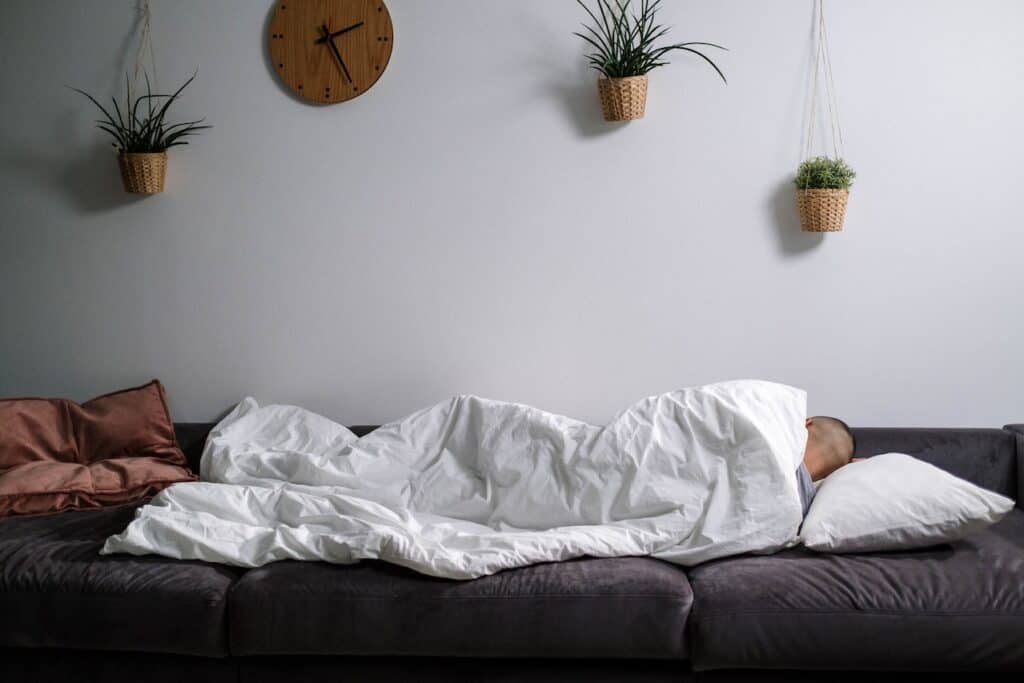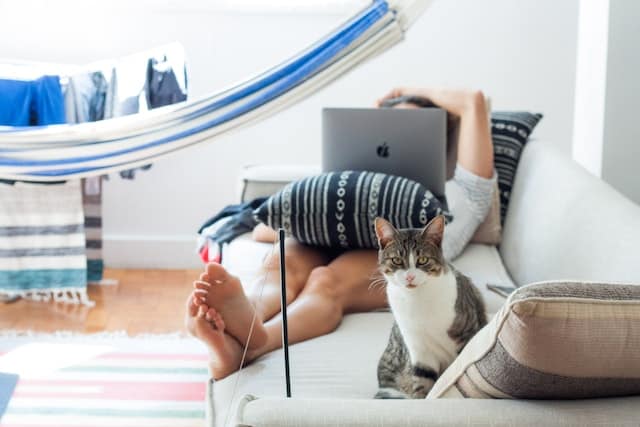
What if a guest overstays and doesn’t pay for the extra hours? What if they dig in their heels and refuse to leave? Indefinite holdovers can and do happen, and they’re a pain to deal with! Here are ways to prevent Airbnb squatters from encroaching and taking over your home.
You’ve probably seen this recent video of an Airbnb host confronting a guest who wouldn’t leave. The guest even threatened to call the police on her.
Or this host who rented her bedroom to a couple who stopped paying and also refused to budge.
While these horror stories aren’t common, they’re very real. You can find them on mainstream news reports, on property owners’ forums, and on YouTube videos discussing overstaying guests.
Some of the most troubling Airbnb squatter accounts that made the headlines can be viewed here, here, and here.
A squatter is someone who trespasses on a property they don’t own and begins living there without permission. They are not tenants and don’t have a lease, title, or any right to be there.
Most overstaying, non-paying guests at an Airbnb are just trespassers. But once they insist on staying and start taking up residence, they turn into squatters.
Squatters are every property owner’s nightmare. Many are scammers and con artists who know the legal loopholes and capitalize on them. Also called “professional tenants”, they rent properties with the intention of not paying rent as long as they can. While they may have paid upfront, such as the first month’s rent and a security deposit, they may never pay another dime again. They’ll try to live rent-free month after month until the owner is able to evict them legally – which involves a lengthy process in court.
With the recent trend in long-term stays, listings on Airbnb, Vrbo, and other vacation rental platforms are falling victim to squatting as well. Guests will intentionally stop paying, refuse to leave, and hold their ground. They’ll even intimidate and threaten property owners, forcing them into a costly, stressful, and months-long litigation. Some even succeed at receiving payment just to vacate the host’s property.
With today’s economic uncertainty and untold numbers suffering from financial hardship after Covid-19, you’ll want to keep an eye out for squatters in your Airbnb.
According to the American Apartment Owners Association (AAOA), squatters’ rights are laws that allow someone to use another person’s property – if the owner doesn’t evict or take action against them. Most states in the U.S. have squatter’s rights, allowing them to gain legality to your property even without paying a single cent of the rent.
But these rights can only be invoked after they’ve occupied your space for a certain period of time. Then they’ll claim that they are tenants so they can remain on the property. If they can show some proof of tenancy to the police such as utility bills – whether true or falsified – the authorities won’t remove them. You may have to start a formal eviction process.
In the home-sharing economy, short-term guests don’t hold leases. So they don’t qualify as tenants nor can they show any proof of tenancy. But guests who go on longer-term stays can enter into a lease agreement with their hosts, usually outside of Airbnb or other online booking platforms. By so doing, they may establish tenant status and gain so-called “squatters’ rights”.
In many states, the duration of occupancy before overstayers can invoke squatter’s rights is 30 days. In others, it’s as short as 14.
So until someone stays long enough on your property to be legally deemed a squatter, they’re just trespassers or loiterers. They can be removed by law enforcers.
But once they stay indefinitely and gain “squatters’ rights”, they become difficult to evict. So you have to act fast when trying to remove overstaying guests.
According to The Balance, squatters obtain rights for similar reasons that tenants have rights – to ensure that a property owner or landlord follows a legal process when evicting someone from their property.
The legal term often used for squatters’ rights is “adverse possession”.
For a list of squatter’s rights by state, check this site.

Each state has laws governing hotels, inns, and other hospitality lodgings. These include sensitive matters such as guest security, evictions, and discrimination.
It’s important that every property owner understands their state and county innkeeper laws, as well as rental and tenancy regulations. That way, they know what they may and may not do if trespassing and squatting occur on their properties.
For example, it’s illegal to shut off utilities, change the locks, or put the guests’ or tenants’ stuff on the street. Nor is it lawful to intimidate, threaten, detain, or physically remove guests from your property.
According to United States general innkeeper laws, an overstaying guest should be removed in a prudent and reasonable manner. Even though they’re not entitled to stay indefinitely, they should be ejected on sufficient notice and without force. Innkeepers or hosts must first request them to depart.
In many jurisdictions, a property owner may call law enforcement to eject trespassers if they fail to leave after being asked.
To see how innkeeper laws can vary from state to state, see this list of hotel guest removal rules for different jurisdictions across the country.
Read also: Hotels vs. Airbnb: How the Hotel Industry Tried but Can Never Destroy Short-term Rentals
As owners and hosts, it’s our duty to protect our properties against squatting. We can’t rely on Airbnb or booking platforms to do it for us because essentially, they’re just marketing channels. They don’t have the legal authority to settle issues like these.
Since laws vary state-to-state, dealing with overstaying guests in your area requires legal proceedings that apply to your specific jurisdiction.
While Airbnb will do its best to assist hosts caught in this kind of situation, we can each take practical measures to deter squatters long before they dig in and set up camp in our properties.
Here are options you can consider doing for your listing:
You want good guests – the ones with good reviews. If you’re okay welcoming guests with zero or just 1 or 2 reviews, then vet them properly. Ask questions like, “What brings you to town?” Or, “Who’s coming with you?” And, “You’re new to Airbnb – why haven’t you used it before, and why are you using it now?”
If you get a vague or elusive response, that’s a red flag. If the guest’s profile has a missing or fake photo, that’s another warning sign. So are missing fields in their bio.
You may also think twice about same-day bookings, especially from locals. Problem situations are more likely to arise from those types of bookings than others.
It’s totally okay to say ‘No’ to inquiries you’re not comfortable with, without being penalized. If you turn those people down, there may be somebody right behind them who’ll turn out to be much better guests.
You can also use guest screening apps for this purpose.
Listings that allow long-term bookings are at higher risk of being squatted on, as are those without a strict cancellation policy.
Sure, long stays are a good way to keep the business afloat – particularly during slow seasons and hard times. But be sure to sign a lease agreement so you’re protected against Airbnb squatters. Hire a real estate attorney who knows the local tenant laws in your area to write the contract for you. Any breach of the contract can be fought in court later on, should the need arise.
And don’t use Instant Book for long stays. You’ll want to be able to interview and vet your guests extensively. And, just like any long-term landlord, verify their employment status. Check their profiles on social media. Run a background check. You may also want to do a credit check or ask to see their W2 tax form.
Charge $50 or whatever amount is is fair for you. Charge it on a per-hour basis. Beyond 2 hours, consider imposing a penalty – something like 50% to 100% of a day’s rate – for their continued holdover. You can also tell guests that if a succeeding guest cancels their booking for the inability to check in, and asks for a refund, they are to assume payment for that refund. Cite it in your house rules.

Send pre-check-out messages. The night before or on checkout morning, remind guests of their checkout time. After thanking them for their stay, asking them if they need anything else, and wishing them ‘Bon voyage’, remind them that the cleaners will be arriving after checkout time and new guests will be checking in soon after.
If guests are running late, call them. Follow up every 30 minutes. Once it’s been an hour, start enforcing late checkout fees. After a couple of hours, you’ll need to formally request them to leave. Tell them they no longer have a valid reservation nor the legal right to stay in your property. That means their continued presence is unauthorized, and amounts to trespassing or loitering. You’ll have to call the police to lawfully escort them out.
Message them privately as well as on Airbnb. That way, everything is documented on the platform. And when you try to bring the issue with Airbnb to file a claim – a refund for the income you lost from a succeeding guest’s cancellation – you’ll have evidence to prove that you handled the matter diplomatically.
Star the messages, take screenshots, or save the conversation in a PDF file so you have them for reference.
Report the issue to Airbnb immediately and ask them to cross-check the trespasser’s account, maybe even flag it. Keep the Airbnb Customer Service number, 1-855-424-7262, handy.
These intuitive locks have keypads that generate unique passcodes for each guest, with the ability to grant only temporary, limited-time access to your unit. Once checkout time lapses, the codes will change and they won’t be able to get back in once they go out. State this in your house rules as well.
Accepting bookings only on Airbnb or other online platforms will give you extra verification checks that direct bookings may not. On Airbnb, you’ll also be eligible for host liability insurance. If somebody overstays at your property and you lose a succeeding booking as a result, Airbnb can reimburse you through Air Cover.
If you must accept direct bookings, require guests to sign a written contract with their ID photo included. (We cover this in our online master class, VRM Formula.)
Avoid third-party bookings as well.
And, as mentioned earlier, keep all messaging on the platform. If a guest books for 20 days and messages you outside Airbnb asking for a 10-day extension, there’s a chance they’re planning on doing something fishy. Keep all transactions and interactions on the platforms.
Don’t allow guests to receive mail and packages at your property with their name. They can use that to claim they’re a tenant.

Don’t subject your property to so much financial strain that you become desperate for bookings and start slashing your rates too cheap. The lower someone pays to stay at your place, the more likely they are to default. Many who resort to squatting are usually under huge financial hardships.
You don’t want to be at a point where you need guests more than they need you.
See if your insurer covers legal fees in case you get a squatter problem and you need to take legal action. Proper Insurance will not only cover legal fees but also loss of business income, eviction expenses (including court costs and sheriff fees), and property damages in the event of a squatter issue.
This is a great option if you live away from your properties and can’t check on them regularly.
Hopefully, you’ll never have to deal with squatters at your Airbnb. These tips help you do just that – prevent overstaying guests from turning into squatters then taking over your property and wreaking havoc. Freeloaders will not only test and drain your patience, they’ll also try to bleed you dry.
Ready to learn how we built & operate a $2M/year short-term rental business, operate properties throughout the USA remotely, and acquired 70+ properties without owning any in just 2 years? Attend our free online masterclass to learn how you can do the same. Click here.